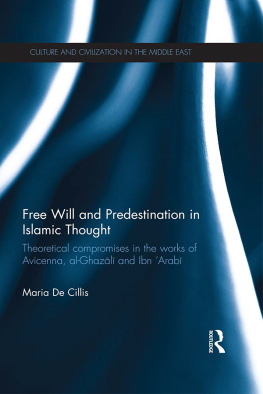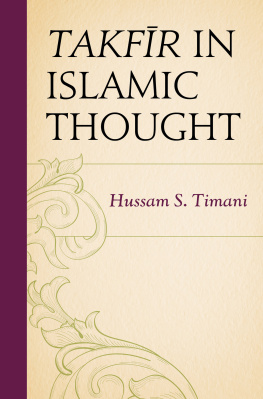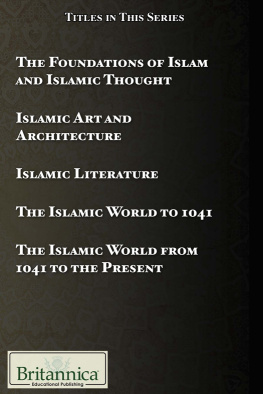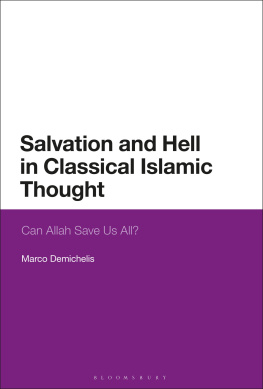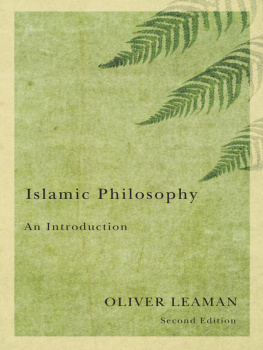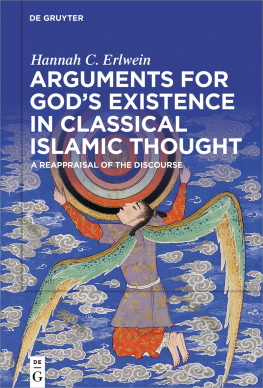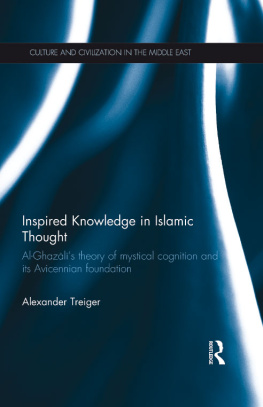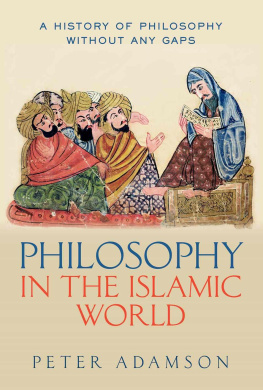Maria De Cillis - Free Will and Predestination in Islamic Thought: Theoretical Compromises in the Works of Avicenna, al-Ghazālī and Ibn ’Arabī
Here you can read online Maria De Cillis - Free Will and Predestination in Islamic Thought: Theoretical Compromises in the Works of Avicenna, al-Ghazālī and Ibn ’Arabī full text of the book (entire story) in english for free. Download pdf and epub, get meaning, cover and reviews about this ebook. year: 2013, publisher: Routledge, genre: Religion. Description of the work, (preface) as well as reviews are available. Best literature library LitArk.com created for fans of good reading and offers a wide selection of genres:
Romance novel
Science fiction
Adventure
Detective
Science
History
Home and family
Prose
Art
Politics
Computer
Non-fiction
Religion
Business
Children
Humor
Choose a favorite category and find really read worthwhile books. Enjoy immersion in the world of imagination, feel the emotions of the characters or learn something new for yourself, make an fascinating discovery.
- Book:Free Will and Predestination in Islamic Thought: Theoretical Compromises in the Works of Avicenna, al-Ghazālī and Ibn ’Arabī
- Author:
- Publisher:Routledge
- Genre:
- Year:2013
- Rating:3 / 5
- Favourites:Add to favourites
- Your mark:
Free Will and Predestination in Islamic Thought: Theoretical Compromises in the Works of Avicenna, al-Ghazālī and Ibn ’Arabī: summary, description and annotation
We offer to read an annotation, description, summary or preface (depends on what the author of the book "Free Will and Predestination in Islamic Thought: Theoretical Compromises in the Works of Avicenna, al-Ghazālī and Ibn ’Arabī" wrote himself). If you haven't found the necessary information about the book — write in the comments, we will try to find it.
The subject of human free-will versus divine predestination is one of the most contentious topics in classical Islamic thought. By focusing on a theme of central importance to any philosophy of religion, and to Islam in particular, this book offers a critical study of the intellectual contributions offered to this discourse by three key medieval Islamic thinkers: Avicenna, al-Ghzl and Ibn Arab.
Through investigation of primary sources, Free Will and Predestination in Islamic Thought establishes the historical, political and intellectual circumstances which prompted Avicenna, al-Ghzl and Ibn Arabs attempts at harmonization. By analysing the theoretical and linguistic techniques which were employed to convey these endeavours, this book demonstrates that the three individuals were committed to compromise between philosophical, theological and mystical outlooks.
Arguing that the three scholars treatments of the so-called qa wal-qadar (decree and destiny) and ikhtiyr (free-will) issues were innovative, influential and fundamentally more complex than hitherto recognized, this book contributes to a fuller understanding of Islamic intellectual history and culture and will be useful to researchers interested in Islamic Studies, Religion and Islamic Mysticism.
Maria De Cillis: author's other books
Who wrote Free Will and Predestination in Islamic Thought: Theoretical Compromises in the Works of Avicenna, al-Ghazālī and Ibn ’Arabī? Find out the surname, the name of the author of the book and a list of all author's works by series.

